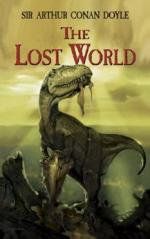Our first care was to make some sort of list of our own stores, so that we might know what we had to rely upon. What with the things we had ourselves brought up and those which Zambo had sent across on the rope, we were fairly well supplied. Most important of all, in view of the dangers which might surround us, we had our four rifles and one thousand three hundred rounds, also a shot-gun, but not more than a hundred and fifty medium pellet cartridges. In the matter of provisions we had enough to last for several weeks, with a sufficiency of tobacco and a few scientific implements, including a large telescope and a good field-glass. All these things we collected together in the clearing, and as a first precaution, we cut down with our hatchet and knives a number of thorny bushes, which we piled round in a circle some fifteen yards in diameter. This was to be our headquarters for the time—our place of refuge against sudden danger and the guard-house for our stores. Fort Challenger, we called it.
It was midday before we had made ourselves secure, but the heat was not oppressive, and the general character of the plateau, both in its temperature and in its vegetation, was almost temperate. The beech, the oak, and even the birch were to be found among the tangle of trees which girt us in. One huge gingko tree, topping all the others, shot its great limbs and maidenhair foliage over the fort which we had constructed. In its shade we continued our discussion, while Lord John, who had quickly taken command in the hour of action, gave us his views.
“So long as neither man nor beast has seen or heard us, we are safe,” said he. “From the time they know we are here our troubles begin. There are no signs that they have found us out as yet. So our game surely is to lie low for a time and spy out the land. We want to have a good look at our neighbors before we get on visitin’ terms.”
“But we must advance,” I ventured to remark.
“By all means, sonny my boy! We will advance. But with common sense. We must never go so far that we can’t get back to our base. Above all, we must never, unless it is life or death, fire off our guns.”
“But you fired yesterday,” said Summerlee.
“Well, it couldn’t be helped. However, the wind was strong and blew outwards. It is not likely that the sound could have traveled far into the plateau. By the way, what shall we call this place? I suppose it is up to us to give it a name?”
There were several suggestions, more or less happy, but Challenger’s was final.
“It can only have one name,” said he. “It is called after the pioneer who discovered it. It is Maple White Land.”
Maple White Land it became, and so it is named in that chart which has become my special task. So it will, I trust, appear in the atlas of the future.




